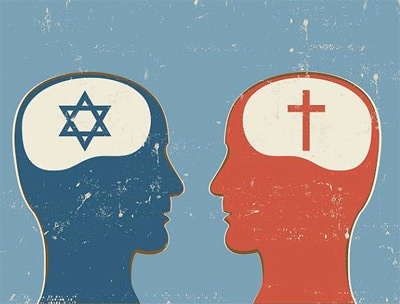Slate’s Double X blog is trumpeting a new study which finds that married interfaith couples are more likely than others to keep their religious beliefs separate. According to Slate blogger Jessica Grose, this is proof that we can say goodbye to the idea that a good marriage requires couples to share religious beliefs.
Videos By Rare
But is that really the case?
The study was released by David McClendon of the University of Texas at Austin. In the 1960s, just over 40 percent of couples married someone from outside of their religion, compared to 55 percent in the early 2000s.
In the past, most couples didn’t remain an interfaith couple. One person, usually the husband, would begin practicing their spouse’s religion. Now, however, more and more couples are marrying someone outside of their religion, and both continue to practice their own, separate religions.
McClendon speculates that this is because tolerance and diversity are on the rise in the United States, but that’s probably not the case. Grose spotlights a Pew survey which found that young adults today are considerably less religious than older Americans. If religion isn’t a major part of a person’s life, then it isn’t surprising that they wouldn’t make it an important part of their marriage.
McClendon also fails to disclose how many of these new interfaith couples are actually practicing their religion, as opposed to being, say, a Catholic in name only.
McClendon closes his study by boasting that this shows the potential for greater religious tolerance among families. He does not, however, highlight the cost of this so-called increased tolerance. In her Slate column, Grose admits that interfaith marriages have a fairly high number of obstacles to overcome. Interfaith couples often do not discuss passing religion down to their children before marriage, and after they’re married and have children, they end up experiencing difficulty raising their children with their beliefs. Interfaith couples also experience more unhappiness. The argument that good marriages can include interfaith couples seems to be lacking so far, although Grose optimistically states that this will change as the country becomes less observant.
Of course, this ignores the fact that 3 out of 4 millennials — the generation mostly in question here — still claim a religious affiliation, and 4 out of 10 claim that they pray every day. This is largely unchanged from young people reaching adulthood in the 90s, so how, exactly, is this an argument for the country becoming less observant?
While it is unsurprising that liberals would get excited at the thought of less religion in traditional marriage, the facts don’t support the premise. Far from demonstrating that new data is showing that a good marriage can exist among interfaith couples, Grose showed that interfaith couples experience much more stress and unhappiness than couples who share their faith. While interfaith marriages are not doomed to fail, they do face more difficult decisions to make, inevitably causing more conflict.
It’s no wonder that interfaith couples report higher levels of unhappiness. Yet we’re supposed to champion this because it might mean that there are higher levels of tolerance? For most people, tolerance isn’t exactly the cornerstone of a marriage. But to liberals, tolerance is everything (except, of course, tolerance towards those who aren’t liberal). Perhaps to people like McClendon and Grose, unhappy yet supposedly tolerant marriages are considered to be a good thing.
If these interfaith couples really were more tolerant though, then where does the unhappiness come from? Or is this really just another way to undermine traditional marriage?

